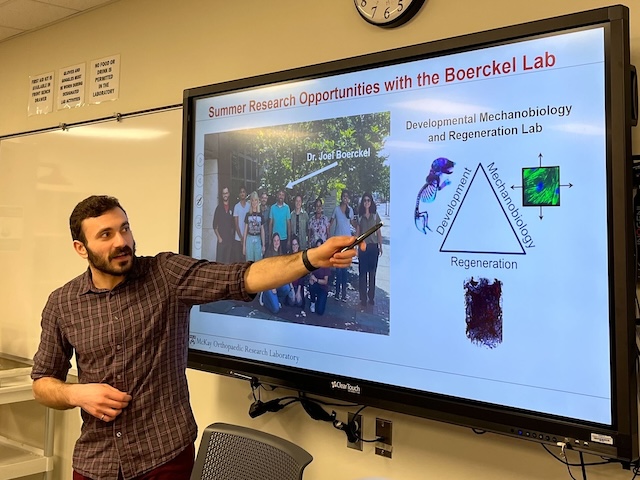Welcome to the PennPORT IRACDA Program
Penn - Postdoctoral Opportunities in Research and Teaching (PennPORT), an NIH sponsored, Institutional Research and Academic Career Development Award (IRACDA) postdoctoral fellowship is supported by the NIH division of NIGMS. The program has been in existence since 2007.
The PennPORT program combines a traditional mentored postdoctoral research experience at the University of Pennsylvania with a mentored teaching experience at a partnering institution. The Program is designed to provide an opportunity for postdoctoral appointees to develop their teaching skills. An integral part of the program is formal instruction in pedagogical methods from the University of Pennsylvania Center for Excellence in Teaching, Learning and Innovation. Postdocs also take advantage of the many research and career success skills training programs provided by Biomedical Postdoctoral Programs (BPP).
The partnering institutions are Delaware County Community College, Lincoln University and Rutgers University Camden Campus. All institutions are in the Philadelphia locality. The PennPORT program is intended to enhance research-oriented teaching at partner institutions, foster collaboration in research and teaching between the faculty at the University of Pennsylvania and that of partner institutions, and encourage undergraduates to enter a career in biomedical research.
The tenure of the fellowship is three years. In addition to providing salary support at Penn-mandated levels, the program provides health benefits, support for teaching supplies, course development, and travel to two professional meetings, one being the IRACDA annual conference.
Recent & Upcoming Events
-
Strategic Evaluations, Inc. presented a workshop on Essentials of Program Evaluation on Jan. 10th. This workshop provided an introduction to program evaluation principles and best practices for STEM. Participants gained increased knowledge of how to strategically incorporate rigorous evaluation methods into their program planning. Key topics included: Evaluation Basics, Understanding Logic Models, IRB Considerations, and Instrument Design Strategies & much more!
-
Applications for the spring 2025 session of “Preparing for College Teaching in STEM” is now closed.
-
PennPORT to Host IRACDA 2026 Conference - stay tuned for more info!
PennPORT Scholar Spotlight Featuring Chris Panebianco

I’m a 3rd year PennPORT Scholar studying orthopaedic developmental mechanobiology, and inspiring diverse students to do the same! My research in Dr. Joel Boerckel’s Laboratory focuses on how mechanical cues guide embryonic and postnatal skeletal development. In addition to my research, I teach classes in Biostatistics and Regenerative Medicine at Rutgers University – Camden. I implement an inquiry-based learning pedagogy in my classes, which challenges students to ask scientific questions, then write research proposals and complete hands-on experiments to answer them. I like this pedagogy because it uses the classroom as a tool to get diverse students excited about STEM research. Beyond the classroom, I’ve been developing extracurricular outreach activities about orthopaedic mechanobiology. Most recently, I’ve worked with the McKay Orthopaedic Research Laboratory to host “Learning on a Limb”, a half-day orthopaedic workshop for high school students. Since 2021, our department has invited diverse students from the greater Philadelphia area onto Penn’s campus and guided them through hands-on orthopaedic activities (e.g.,biomechanically testing tendons). We showed that Learning on a Limb effectively taught students about orthopaedics, enhanced their interest in orthopaedic research, and connected them to additional research opportunities at Penn. I’m excited to continue this initiative, and develop new impactful initiatives that will galvanize the next generation of diverse orthopaedic researchers!

